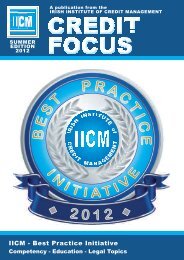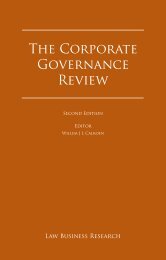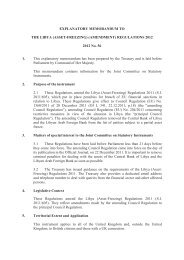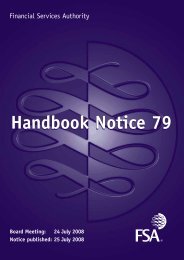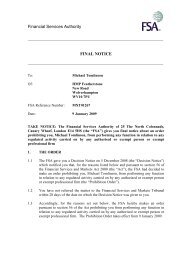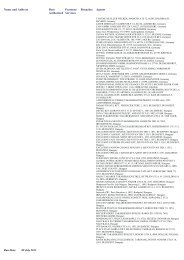FSA Annual Report 2006/07 - Better Regulation Ltd
FSA Annual Report 2006/07 - Better Regulation Ltd
FSA Annual Report 2006/07 - Better Regulation Ltd
You also want an ePaper? Increase the reach of your titles
YUMPU automatically turns print PDFs into web optimized ePapers that Google loves.
18<br />
Section one – Promoting efficient, orderly and fair markets<br />
<strong>FSA</strong> <strong>Annual</strong> <strong>Report</strong> <strong>2006</strong>/<strong>07</strong><br />
In February 20<strong>07</strong> we obtained an injunction against two individuals to<br />
restrain the proceeds of suspected market abuse. It appears that one of<br />
the individuals was an insider to an impending takeover announcement<br />
and may have passed information to another individual who traded on the<br />
basis of that information. The individuals concerned made a profit of<br />
£50,000. This is the first time we have obtained an asset freezing<br />
injunction under FSMA for the proceeds of suspected market abuse. Our<br />
investigation continues.<br />
We have increased our focus on antimarket<br />
abuse systems and controls.<br />
Our supervisory risk assessments<br />
have reviewed controls and, where<br />
relevant, highlighted areas for<br />
improvement. We have set out what<br />
we expect of firms’ senior<br />
management and have completed a<br />
range of thematic work to review<br />
practices and raise standards,<br />
providing feedback to the industry<br />
through our MarketWatch<br />
newsletters. This has included<br />
reviews of the credit markets, the<br />
controls over information during<br />
public takeovers and suspicious<br />
transaction reporting.<br />
In March 20<strong>07</strong> we published an<br />
updated measure of UK market<br />
cleanliness. We measured this by<br />
looking at the extent to which share<br />
prices move ahead of the regulatory<br />
announcements that companies make<br />
to the market. We welcomed the<br />
improving trend in market<br />
cleanliness; however, the figures for<br />
takeover announcements remain a<br />
cause for concern. We have launched<br />
a major project to review the controls<br />
over price-sensitive information in<br />
relation to takeovers.<br />
Finally, we have continued our<br />
programme to enhance our<br />
transaction monitoring system, Sabre<br />
2. Following a comprehensive<br />
procurement exercise we signed a<br />
contract with an external supplier to<br />
develop a new system, and work is<br />
now progressing on designing and<br />
building it. The new system will<br />
significantly enhance our capability<br />
to detect market abuse as well as<br />
enabling us to comply with our<br />
obligations under MiFID to exchange<br />
transaction reports with our<br />
Committee of European Securities<br />
Regulators (CESR) colleagues.<br />
Financial stability<br />
We have worked closely within the<br />
framework of the Tripartite<br />
Authorities – the <strong>FSA</strong>, the Bank of<br />
England and the Treasury – to<br />
develop Factbooks, which provide<br />
key information on major firms<br />
needed in the event of a financial<br />
crisis. They are designed to minimise<br />
the burden on firms by using data<br />
which firms might use for their own<br />
internal management purposes. In<br />
January 20<strong>07</strong> we launched a system<br />
to capture this data, which firms are<br />
providing voluntarily.<br />
We reviewed the stress-testing<br />
practices in ten large firms in the<br />
banking, building society and<br />
investment banking sectors. Most<br />
firms had practices that went some<br />
way to meeting our requirements but<br />
further improvements were needed,<br />
particularly where firms were not<br />
fully taking into account severe but<br />
plausible scenarios when making<br />
strategic or risk management<br />
decisions. In addition, together with<br />
the Bank of England, we organised a<br />
series of seminars with major firms<br />
to explore improvements in their<br />
stress testing. It is the responsibility<br />
of a firm’s senior management to<br />
ensure that its affairs are adequately<br />
monitored and controlled.<br />
In <strong>2006</strong> we led a market-wide<br />
exercise on behalf of the Tripartite<br />
Authorities based on a flu pandemic<br />
scenario. The simulation ran for six<br />
weeks and involved 3,500 staff from<br />
70 organisations. In January 20<strong>07</strong><br />
we published a report setting out the<br />
main lessons learned. This work has<br />
led to a substantial improvement in<br />
Tripartite and participants’<br />
preparedness to deal with a<br />
pandemic and has raised some<br />
substantial topics for further<br />
consideration. There has been strong<br />
interest from overseas regulators in<br />
our model.<br />
In November <strong>2006</strong> we launched a<br />
business continuity management<br />
toolkit for firms. It is an online selfassessment<br />
tool and a guide<br />
containing examples of standard and<br />
leading market practice. It helps<br />
firms to measure their resilience and<br />
recovery capability and to identify<br />
improvements to strengthen their<br />
business continuity and crisis<br />
management arrangements.<br />
Combating financial crime<br />
We have played a leading role in<br />
moving the UK towards a more<br />
principles- and risk-based approach<br />
to financial crime. We have made<br />
changes to our own rules; in August<br />
<strong>2006</strong> we replaced our Money<br />
Laundering Sourcebook with highlevel<br />
guidance in our Senior<br />
Management, Systems and Controls<br />
Sourcebook. We also worked with<br />
the Joint Money Laundering<br />
Steering Group (JMLSG) on its<br />
review of its Guidance Notes,<br />
participated in the negotiations over<br />
the Third EU Money Laundering<br />
Directive and helped the Financial<br />
Action Task Force to develop a riskbased<br />
approach to anti-money<br />
laundering and counter-terrorist<br />
financing. All these developments<br />
should lead to a more cost-effective<br />
regime which is responsive to<br />
developments in financial crime



